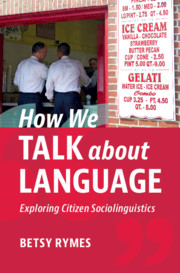Book contents
- How We Talk about Language
- How We Talk about Language
- Copyright page
- Contents
- Figures
- Tables
- Preface
- Introduction
- 1 Citizen’s Arrest!
- 2 Wonderment
- 3 Doing Citizen Sociolinguistics
- 4 Fomenting Wonderment and Critique
- 5 Citizen Sociolinguistics and Narrative
- 6 Acts of Citizen Sociolinguistics
- Conclusion
- References
- Index
4 - Fomenting Wonderment and Critique
Feedback Loops
Published online by Cambridge University Press: 07 September 2020
- How We Talk about Language
- How We Talk about Language
- Copyright page
- Contents
- Figures
- Tables
- Preface
- Introduction
- 1 Citizen’s Arrest!
- 2 Wonderment
- 3 Doing Citizen Sociolinguistics
- 4 Fomenting Wonderment and Critique
- 5 Citizen Sociolinguistics and Narrative
- 6 Acts of Citizen Sociolinguistics
- Conclusion
- References
- Index
Summary
In any given interaction, what counts as smart or insightful or correct, can be produced through feedback loops: Face-to-face, nods of agreement suggest we have the right answer. Online, the “best answer” moves to the top of Yahoo Answers, the “top definition” is the first seen in Urban Dictionary, and the most-viewed hits for “succinct pronunciation?” moves to the top of a google search. All the other answers drift further down your screen. This chapter illustrates both the positive and negative effects of feedback loops on how we talk about language and how we function as citizens. We’ll look at how feedback loops have the potential both to create a reality through the senses of shared identity and positive affiliation they can create and to put up barriers that keep people isolated from others’ ideas. Then, we’ll look closely at one case at Duke University in which citizen sociolinguists were able to disrupt entrenched social norms by breaking down those feedback loops and exposing different assumptions behind the ways we use language.
- Type
- Chapter
- Information
- How We Talk about LanguageExploring Citizen Sociolinguistics, pp. 128 - 149Publisher: Cambridge University PressPrint publication year: 2020



